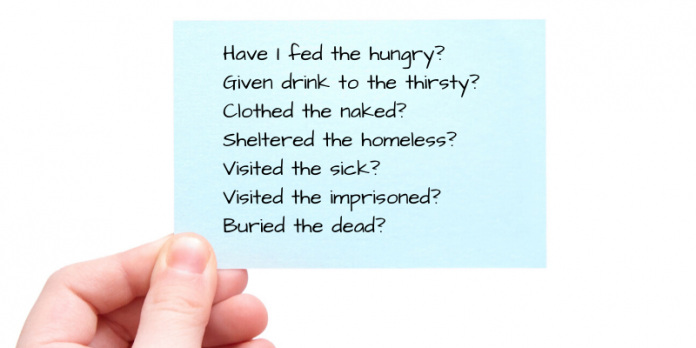
Possible variations
JARED DEES
While preparing students to participate in the Sacrament of Penance and Reconciliation, it is customary to supply them with a set of questions to help them in making an examination of conscience. They can read and reflect on these questions ahead of time in class, at home, or during the quiet time while they wait for their opportunity to go to confession.
The Ten Commandments are the most reliable basis of an examination of conscience, but they do not have to be the only form of preparation, especially if students have good familiarity with them. As you help your students prepare for confession, consider a few other sources. Here are a few ideas that can build upon what is covered in the Ten Commandments:
The Greatest Commandment
When the scholar of the law asked Jesus which commandment was the greatest, he responded by essentially summarizing the Ten Commandments as “Love the Lord, your God, with all your heart, with all your soul, and with all your mind” and “Love your neighbor as yourself ” (Matthew 22:37, 39). For good reason, therefore, many examinations of conscience based on the Ten Commandments divide the questions into two groups: love of God and love of neighbor. To simplify things even further for your students, you may invite them to reflect on only these two commandments.
■ When have I failed to love God with all my heart, soul, and mind?
■ When have I failed to love my neighbor as myself?
The Beatitudes
Next to the Ten Commandments, the Beatitudes are probably the most important set of teachings regarding Christian morality. A simple way to use the Beatitudes to prepare for the Sacrament of Penance is to reformat each Beatitude as a question:
1. Have I made myself poor in spirit or have I been filled with pride?
2. Have I comforted those who mourn or have I made others sad by my actions?
3. Have I been meek or have I let anger overcome me?
4. Have I hungered and thirsted for righteousness or have I intentionally done what is wrong?
5. Have I been merciful or have I held grudges against people who offend me?
6. Have I kept my heart clean or have I looked at pictures or videos that are inappropriate?
7. Have I sought to make peace with others or have I started arguments and fights?
8. Have I defended those who suffer insults or have I participated in gossip and talking behind someone’s back?
The Works of Mercy
As your students approach the Sacrament of Penance and Reconciliation — seeking God’s
mercy — encourage them to reflect on how merciful they have been using the Corporal and
Spiritual Works of Mercy:
■ Corporal Works of Mercy: Have I fed the hungry? Given drink to the thirsty? Clothed the naked? Sheltered the homeless? Visited the sick? Visited the imprisoned? Buried the dead?
■ Spiritual Works of Mercy: Have I counseled the doubtful? Instructed the ignorant? Admonished sinners? Comforted the sorrowful? Forgiven offenses? Borne wrongs patiently? Prayed for the living and the dead?
Catholic prayers
Finally, the rich devotional life of the Church can also be a source for a good examination of
conscience. Here are a couple examples of how prayers can be transformed into a set of questions to reflect on before confession:
THE LORD’S PRAYER
■ Have I loved God like a father?
■ Have I kept God’s name holy or used his name in vain?
■ Have I welcomed God’s kingdom or put my faith in myself or others instead?
■ Have I chosen my will over God’s will in any way?
■ Have I forgiven others? Have I sought the forgiveness of others?
■ Have I avoided temptation or put myself in a position to sin?
■ Have I participated in any evil acts?
THE ACT OF CHARITY
■ Have I loved God above all things?
■ Have I loved God with my whole heart and soul or held back in some way?
■ Have I had any doubts about God’s goodness?
■ Have I loved my neighbor as myself?
■ Have I forgiven all who have injured me?
■ Have I asked pardon of all whom I have injured?
Giving your students some creative options for making an examination of conscience can help prepare them to experience more fully the grace and healing that awaits them in confession.
Jared Dees is the founder of TheReligionTeacher.com and author of Christ in the Classroom: Lesson Planning for the Heart and Mind
This article was originally published in Catechist magazine, January 2020
PHOTO: KACZKA/ISTOCK




